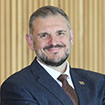Principal Investigator for COMPASS, Professor Frank Doyle and Dr Paul Kavanagh, Consultant in Public Health Medicine, HSE Tobacco Free Ireland Programme and Honorary Lecturer, RCSI describe the work they are doing to reduce the harm caused by tobacco use in Ireland.
Global leaders in tobacco control recently convened in Dublin for the World Conference on Tobacco Control. This was the first face-to-face global summit on tackling the harm caused by tobacco products since 2018, and was opened by Dr Tedros Adhanom Ghebreyesus, Director General of the WHO and Mr Michael Martin, Taoiseach of Ireland.
Tackling smoking, especially in groups in our population who are furthest behind in their health, remains one of the most important and complex challenges facing public health in Ireland.
A new report on the global tobacco epidemic launched by the WHO at the recent World Conference on Tobacco Control highlighted progress in reducing the harm caused by tobacco: 6.1 billion people are now covered by at least one best-practice tobacco control measure.
Nevertheless, tobacco use remains a significant global health challenge, responsible for over 7 million deaths annually as well as disability and long-term suffering from tobacco-related diseases.
In Ireland, tobacco use remains the leading preventable cause of disease and is estimated to cause almost 100 deaths and 1,000 hospitalisations each week. A recent National Cancer Registry of Ireland report found that 10 new cancer cases each day in Ireland are due to tobacco use.
The 2025 goal of a Tobacco Free Ireland, with a smoking prevalence of less than 5%, has been missed, reductions in smoking prevalence have stalled, and new issues such as novel nicotine products (including e-cigarettes and nicotine pouches) are emerging. Tobacco control is at a critical juncture globally and in Ireland.
Building a path
At the recent conference, the RCSI School of Population Health showcased work from its ongoing partnership with the HSE Tobacco Free Ireland Programme. This partnership began in 2018, when Professor Frank Doyle joined the Expert Advisory Group for the development of Ireland’s first National Stop Smoking Guidelines, led by Dr Paul Kavanagh. Since then, RCSI and HSE Tobacco Free Ireland Programme have worked together on research to inform improvement in stop smoking care and build a path for a tobacco-free Ireland.
We presented early findings from COMPASS, an HRB-funded Applied Partnership Award initiative, which is using behavioural science and partnership with the public and healthcare providers to co-design financial incentives to help people in the most disadvantaged communities in Ireland to stop smoking.
Through a series of co-design workshops and combining findings with theory on behaviour change and implementation, we have successfully created a pilot incentive programme, and we are now preparing for a first-of-its-kind evaluation study of this incentive programme in Ireland.
The co-design workshops are critical in ensuring that the knowledge of the groups most affected by smoking are used in the design of incentive programmes that could help. Working together with the local communities and the HSE Tobacco Free Ireland Programme has been invaluable, and we simply could not have designed a robust incentive structure without their input.
Health and societal burden
COMPASS is just one component in a comprehensive multi-annual programme of research collaboration between the HSE Tobacco Free Ireland Programme and the School of Population Health at RCSI.
The partnership has published a number of papers to date, addressing key issues in tobacco control including socio-economic variation, financial incentives to stop smoking and equity impact of plain packaging legislation, and a forthcoming paper estimates the current health and societal burden of tobacco nationally:
- Delineating widening socio-economic inequalities in smoking in Ireland
- Exploration of the potential impact of different designs for financial incentives to stop smoking
- Measuring public support for ending the tobacco epidemic in Ireland
- Tracking recent trends in the evolution of tobacco and other nicotine product use in Ireland
- Assessing the impact of tobacco product plain packaging across socioeconomic groups in Ireland.
Work has also recently commenced on developing an evidence base for services to help people stop using e-cigarettes, as well as building a population health model to explore the health and social consequences of smoking in Ireland under different policy scenarios.

Professor Frank Doyle is Associate Professor in Psychology at RCSI. He coordinates and teaches behavioural sciences and statistics to health professionals at both undergraduate and postgraduate levels.
 Dr Paul Kavanagh is an Honorary Clinical Senior Lecturer, Epidemiology and Public Health and RCSI's School of Population Health.
Dr Paul Kavanagh is an Honorary Clinical Senior Lecturer, Epidemiology and Public Health and RCSI's School of Population Health.
RCSI is committed to achieving a better and more sustainable future through the UN Sustainable Development Goals.
![]()
![]()

